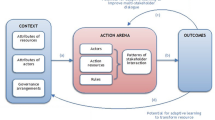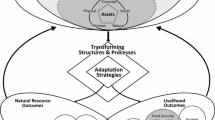Abstract
This study explores the way climate change adaptation projects in Cambodia and Lao PDR have been framed. Four frames were identified: inadequate infrastructure; information deficits; limited planning capacity; and insecure access. In all frames, there was internal coherence among: the problems identified; the form solutions are expected to take; and who should be included and in what roles. All projects claimed to be addressing the needs of farmers vulnerable to climate change. The infrastructure, information, and capacity frames are apolitical and privilege expert knowledge, whereas the access frame places rights and justice issues centrally, and thus holds more potential for addressing the root causes of vulnerabilities and supporting more just distribution of resources and power. Framing can interact with how projects are governed, for example, through assigning roles to actors based on types of solutions prescribed. The extent and direction of frame elaboration also depend on how a project is governed. Meeting local needs and objectives, for example, is constrained when external actors have too much influence in project governing structures, and initial project plans written from afar are followed too narrowly. This study shows that frames are an important part of the governance of adaptation projects.
Similar content being viewed by others
Notes
Interview, LGCC project member, 2014.
Interview, ADB Official, February 2014.
Interview, Project Adviser, 29 April 2014.
Interview, project official, 25 April 2014.
References
ACIAR. (2010). Developing research options to mainstream climate adaptation into farming systems in Cambodia, Laos, Bangladesh and India. Final Report Canberra: Australian Centre for International Agricultural Research.
ADB. (2012a). Proposed loan and administration of loan and grant. Kingdom of Cambodia: Greater Mekong Subregion Flood and Drought Risk Management and Mitigation Project. Project Administration Manual. Manila: Asian Development Bank.
ADB. (2012b). Proposed loan and administration of loan and grant. Kingdom of Cambodia: Greater Mekong Subregion Flood and Drought Risk Management and Mitigation Project. Report and Recommendation of the President to the Board of Directors. Manila: Asian Development Bank.
ADB. (2013). Proposed loans and administration of grants and loan. Kingdom of Cambodia: Climate-Resilient Rice Commercialization Sector Development Program. Report and Recommendation of the President to the Board of Directors. Manila: Asian Development Bank.
Adger, W. N., Benjaminsen, T. A., Brown, K., & Svarstad, H. (2001). Advancing a political ecology of global environmental discourses. Development and Change, 32, 681–715.
Baird, I. G., & Barney, K. (2017). The political ecology of cross-sectoral cumulative impacts: Modern landscapes, large hydropower dams and industrial tree plantations in Laos and Cambodia. Journal of Peasant Studies. https://doi.org/10.1080/03066150.2017.1289921.
Benford, R., & Snow, D. (2000). Framing processes and social movements: An overview and assessment. Annual Review of Sociology, 26, 611–639.
Bisaro, A., Wolf, S., & Hinkel, J. (2010). Framing climate vulnerability and adaptation at multiple levels: Addressing climate risks or institutional barriers in Lesotho? Climate and Development, 2(2), 161–175. https://doi.org/10.3763/cdev.2010.0037.
Bowen, K. J., Miller, F., Dany, V., McMichael, A. J., & Friel, S. (2013). Enabling environments? Insights into the policy context for climate change and health adaptation decision-making in Cambodia. Climate and Development, 5(4), 277–287.
Cacciatore, M. A., Scheufele, D. A., & Iyengar, S. (2016). The end of framing as we know it … and the future of media effects. Mass Communication and Society, 19(1), 7–23. https://doi.org/10.1080/15205436.2015.1068811.
Carter, J., & Sok, V. (2013). Cambodia community based adaptation programme (CCBAP). Programme Review. Final Report, Feb 13, 2013. Swedish International Development Agency.
Christoplos, I., & McGinn, C. (2016). Climate change adaptation from a human rights perspective: Civil society experiences in Cambodia. Forum for Development Studies, 43(3), 437–461. https://doi.org/10.1080/08039410.2016.1199443.
D’Agostino, A. L., & Sovacool, B. K. (2011). Sewing climate-resilient seeds: Implementing climate change adaptation best practices in rural Cambodia. Mitigation and Adaptation Strategies for Global Change, 16(6), 699–720.
Dahlgren, S., Christoplos, I., & Phanith, C. (2013). Evaluation of the Joint Climate Change Initiative (JCCI) in Cambodia. Final Report. Dec 2013. Stockholm: Swedish International Development Cooperation Agency.
Dany, V., Taplin, R., Bajracharya, B., Regan, M., & Lebel, L. (2017). Entry points for climate-informed planning for the water resources and agriculture sectors in Cambodia. Environment, Development and Sustainability, 19(4), 1167–1188. https://doi.org/10.1007/s10668-016-9788-5.
Dewulf, A. (2013). Contrasting frames in policy debates on climate change adaptation. Wiley Interdisciplinary Reviews: Climate Change, 4(4), 321–330.
Dwyer, M. B. (2015). The formalization fix? Land titling, land concessions and the politics of spatial transparency in Cambodia. The Journal of Peasant Studies, 42(5), 903–928. https://doi.org/10.1080/03066150.2014.994510.
Eriksen, S. H., Nightingale, A. J., & Eakin, H. (2015). Reframing adaptation: The political nature of climate change adaptation. Global Environmental Change, 35, 523–533. https://doi.org/10.1016/j.gloenvcha.2015.09.014.
Fünfgeld, H., & McEvoy, D. (2014). Frame divergence in climate change adaptation policy: Insights from Australian local government planning. Environment and Planning C: Government and Policy, 32(4), 603–622.
Godfrey-Wood, R., & Naess, L. O. (2016). Adapting to climate change: Transforming development? IDS Bulletin, 47(2), 49–62. https://doi.org/10.19088/1968-2016.131.
High, H. (2013). Laos in 2012: In the Name of Democracty. Southeast Asian Affairs, 2013, 135–150.
Hurlbert, M. (2015). Learning, participation, and adaptation: Exploring agri-environmental programmes. Journal of Environmental Planning and Management, 58(1), 113–134. https://doi.org/10.1080/09640568.2013.847823.
Hurlbert, M. A., & Diaz, H. (2013). Water governance in Chile and Canada: A comparison of adaptive characteristics. Ecology and Society. https://doi.org/10.5751/es-06148-180461.
JCCI. (2013a). A guide to climate change response: A learning manual for Cambodian organisations and institutions. Phnom Penh: Joint Climate Change Initiative Cambodia and Partners.
JCCI. (2013b). JCCI Newsletter #12. Aug 2013. Phnom Penh: Joint Climate Change Initiative.
Jerneck, A. (2014). Searching for a mobilizing narrative on climate change. Journal of Environment and Development, 23(1), 15–40.
Käkönen, M., Lebel, L., Karhunmaa, K., Dany, V., & Try, T. (2014). Rendering climate change governable in the least-developed countries: Policy narratives and expert technologies in Cambodia. Forum for Development studies, 41(3), 351–376. https://doi.org/10.1080/08039410.2014.962599.
Kallis, G., & Zografos, C. (2014). Hydro-climatic change, conflict and security. Climatic Change, 123(1), 69–82. https://doi.org/10.1007/s10584-013-0893-2.
Lebel, L., Grothmann, T., & Siebenhuner, B. (2010). The role of social learning in adaptiveness: Insights from water management. International Environmental Agreements, 10, 333–353.
Lebel, L., Salamanca, A., & Kallayanamitra, C. (2017). The governance of adaptation financing: Legitimacy at multiple levels. International Journal of Global Warming, 11(2), 226–245.
MAF, & UNDP. (2010). Improving the resilience of the agriculture sector in Lao PDR to climate change impacts. Project Document. Ministry of Agriculture and Forestry Lao PDR and United Nations Development Programme.
MOI, & UNCDF. (2015). LoCAL pilot phase in Cambodia. Final Assessment. New York: Ministry of Interior, Royal Government of Cambodia, and Local Climate Adaptive Living Facility, United Nations Capital Development Fund.
MRC. (2014a). Local demonstration projects on climate change adaptation: Final report of the first batch projects in Lao PDR. Demonstration Project Series No. 1. Vientiane: Mekong River Commission.
MRC. (2014b). Mid-term review of the MRC programmes: Climate change and adaptation initiative. April 2014. Vientiane: Mekong River Commission.
O’Brien, K., Eriksen, S., Nygaard, L. P., & Schjolden, A. N. E. (2007). Why different interpretations of vulnerability matter in climate change discourses. Climate Policy, 7(1), 73–88. https://doi.org/10.1080/14693062.2007.9685639.
Pan, Z., & Kosicki, G. M. (1993). Framing analysis: An approach to news discourse. Political Communication, 10(1), 55–75. https://doi.org/10.1080/10584609.1993.9962963.
Paschen, J. A., & Ison, R. (2014). Narrative research in climate change adaptation—Exploring a complementary paradigm for research and governance. Research Policy, 43(6), 1083–1092.
Phadke, R., Manning, C., & Burlager, S. (2015). Making it personal: Diversity and deliberation in climate adaptation planning. Climate Risk Management, 9, 62–76. https://doi.org/10.1016/j.crm.2015.06.005.
PLAN International, & ADB. (2015). Mainstreaming climate resilience into development planning—Civil society support mechanism. Inception Report. Manila: Asian Development Bank.
Ribot, J. (2014). Cause and response: Vulnerability and climate in the Anthropocene. Journal of Peasant Studies, 41(5), 667–705.
Roth, C. H., & Grünbühel, C. (2012). Developing multi-scale adaptation strategies: A case study for farming communities in Cambodia and Laos. Asian Journal of Environment and Disaster Management. https://doi.org/10.3850/S1793924012100055.
Scheufele, D. A., & Tewksbury, D. (2006). Framing, agenda setting, and priming: The evolution of three media effects models. Journal of Communication, 57(1), 9–20.
Shanahan, E. A., Jones, M. D., & McBeth, M. K. (2011). Policy narratives and policy processes. Policy Studies Journal, 39(3), 535–561.
Snow, D. (2004). Framing processes, ideology, and discursive fields. In D. Snow, S. Soule, & H. Kriesi (Eds.), The Blackwell companion to social movements (pp. 380–412). Oxford: Blackwell Publishing.
Sovacool, B. K., D’Agostino, A. L., Rawlani, A., & Meenawat, H. (2012). Improving climate change adaptation in least developed Asia. Environmental Science & Policy, 21, 112–125.
Sovacool, B. K., Linnér, B.-O., & Klein, R. J. T. (2017a). Climate change adaptation and the Least Developed Countries Fund (LDCF): Qualitative insights from policy implementation in the Asia-Pacific. Climatic Change, 140(2), 209–226. https://doi.org/10.1007/s10584-016-1839-2.
Sovacool, B. K., Tan Mullins, M., Ockwell, D., & Newell, P. (2017b). Political economy, poverty, and polycentrism in the Global Environment Facility’s Least Developed Countries Fund (LDCF) for Climate Change Adaptation. Third World Quarterly. https://doi.org/10.1080/01436597.2017.1282816.
Taylor, M. (2013). Climate change, relational vulnerability and human security: Rethinking sustainable adaptation in agrarian environments. Climate and Development, 5(4), 318–327. https://doi.org/10.1080/17565529.2013.830954.
Taylor, M. (2014). The political ecology of climate change adaptation: Livelihoods, agrarian change and the conflicts of development. London: Routledge.
UNDP. (2009). Promoting climate-resilient water management and agricultural practices in rural Cambodia. PIMS no. 3867. 29 April 2009 United Nations Development Programme.
UNDP. (2010). Cambodia community based adaptation programme (CCBAP). Project document. United Nations Development Programme.
UNDP. (2012a). Effective governance for small-scale rural infrastructure and disaster preparedness in a changing climate (LDCF2). Project Document. Vientiane: United Nations Development Programme.
UNDP. (2012b). Promoting climate resilient water management and agricultural practices in rural Cambodia. Annual Project Report 2012. United Nations Development Programme.
UNDP. (2013). Integrated disaster and climate risk management project in Lao PDR. Project Document. United Nations Development Programme.
UNDP. (2016). Effective governance for small-scale rural infrastructure and disaster preparedness in a changing climate (LDCF2). Project Brief. Vientiane: United Nations Development Programme.
UNDP, & MONRE. (2016). Effective governance for small-scale rural infrastructure and disaster preparedness in a changing climate. Mid-term Review. United Nations Development Programme.
van Hulst, M., & Dvora, Y. (2016). From policy “frames” to “framing”: Theorizing a more dynamic, political approach. The American Review of Public Administration, 46(1), 92–112. https://doi.org/10.1177/0275074014533142.
Weisser, F., Bollig, M., Doevenspeck, M., & Müller Mahn, D. (2014). Translating the ‘adaptation to climate change’ paradigm: The politics of a travelling idea in Africa. The Geographical Journal, 180(2), 111–119.
Author information
Authors and Affiliations
Corresponding author
Rights and permissions
About this article
Cite this article
Lebel, L., Käkönen, M., Dany, V. et al. The framing and governance of climate change adaptation projects in Lao PDR and Cambodia. Int Environ Agreements 18, 429–446 (2018). https://doi.org/10.1007/s10784-018-9397-x
Accepted:
Published:
Issue Date:
DOI: https://doi.org/10.1007/s10784-018-9397-x




